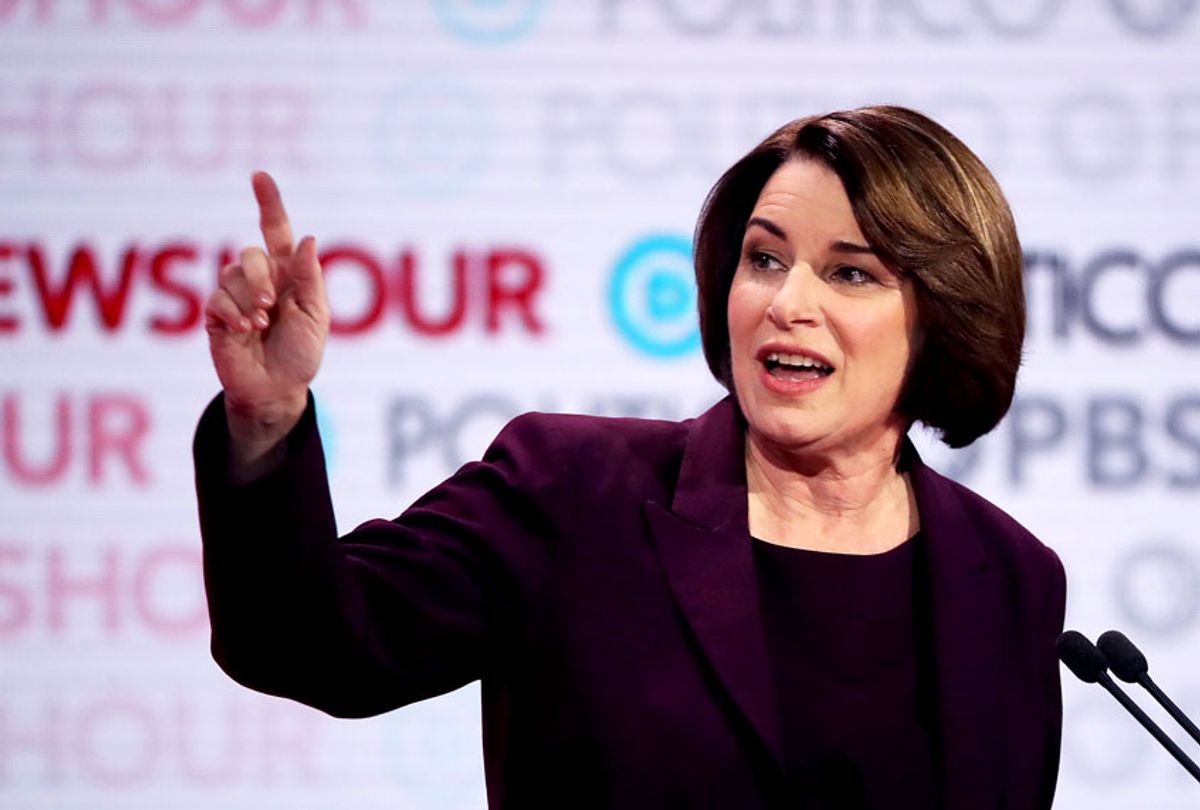The politerati just can't get over how good Amy Klobuchar is at losing. A longtime favorite of many Beltway pundits for her high approval rating in her home state of Minnesota, Klobuchar's third-place finish in the New Hampshire primary was somehow a bigger deal to many in the media than Senator Bernie Sanders' actual victory. Klobuchar's national support is so low she doesn't even register on some of the latest national polls, yet she's somehow still the candidate to watch. And if you disagree, clearly you're just not "in the know."
But okay, let's take the horserace experts at their word. Assume, for the sake of argument, that Klobuchar is a true contender. What would that tell us about modern politics?
It might tell us that liberal pundits like a good performance more than they want someone who actually shares their values.
When the media fawns over Klobuchar, it's usually related to her above-average debate performances and ability to project the sort of hardscrabble Midwestern persona that coastal liberals assume heartlanders find authentic. (Disclosure: I am a coastal liberal, just a self-hating one.) Invisible in this persona are the pervasive stories that Capitol Hill journalists have heard for years of Klobuchar mistreating her staff. At the very least, her reputation as a nightmare boss should undercut the working-class bona fides for which Klobuchar must reach back to her grandfather to assert, even if she is adept at telling and retelling a few focus-grouped zingers.
What about her policies? Here again, a peek beneath the surface should reveal cause for populist minded voters to worry. My organization, the Revolving Door Project, works to draw attention to the vast powers a president and their appointees can use without ever having to call on Congress. Klobuchar has demonstrated a marked appreciation for these oft-overlooked presidential powers; early in her campaign, she released an extensive list of actions she would take in her first 100 days in office, many of which relied on executive authority.
These include requisite actions that almost every candidate in the Democratic field has endorsed, like re-entering the Paris climate accords and fully enforcing the Affordable Care Act. Klobuchar also aims to differentiate herself with a focus on agricultural issues, especially breaking up monopolistic food distributors. We find this focus admirable.
But we remain concerned because Klobuchar leaves one important question unanswered: Whom will she trust to actually carry all of this out? To find out, one should look at her list of bundlers, the uber-wealthy backers who hit up friends and colleagues for donations of more than $25,000 at a time to the campaign. Bundlers historically either end up among the 4,000-plus appointees each president must make across the executive branch, or at least have a major say in who gets what job. All bundlers are influential, but those who cultivated relationships long before the candidate ran for president are doubly so.
In Klobuchar's case, one such bundler is David MacLennan, the chair and chief executive of agri-giant Cargill. Cargill's employees and corporate PAC have collectively given nearly $120,000 to her campaigns over the years.
Why does this matter? Because Cargill was once called "the worst company in the world" by Klobuchar's former colleague Rep. Henry Waxman due to its long history of deforestation, child labor, pollution, monopolistic behavior, and opposition to health and safety reforms. And when push came to shove, Klobuchar repeatedly voted how Cargill wanted. She voted to exempt the agriculture industry from greenhouse-gas emissions rules, voted against an overhaul of rules that allow Cargill to tax farmers to fund their own lobbying efforts(!), and even demanded the Obama administration stop trying to reduce sodium in school lunches. These were all policies for which Cargill actively lobbied at the time.
Do Democrats want a president who will fight climate change? Then they don't want Cargill's allies in charge of the Environmental Protection Agency (EPA). Do they want a president who will fight corporate power? Then they don't want Cargill's allies at the Federal Trade Commission (FTC). Do they want a president who will prioritize their children's health? Then they don't want Cargill's allies at the Food and Drug Administration (FDA) or running the Education Department's school lunch program (Cargill and Klobuchar have claimed that tomato paste constitutes a serving of vegetables).
Yet that's what they're at risk of getting if Klobuchar becomes president. Likewise, a Pete Buttigieg presidency could see Google and Facebook allies in key administrative jobs; a Joe Biden presidency could see private equity thieves across the government; and a Mike Bloomberg presidency could see Bloomberg LP employees take over Bloomberg-regulating financial agencies, while the whole thing is covered by Bloomberg News.
A candidate's record matters. Their major funders matter, perhaps more than any legislative proposal ever will. Polls show that voters show are fed up with big money poisoning politics. Here's hoping the punditry catches up soon, so we can start talking about power and stop talking about one-liners.

Shares